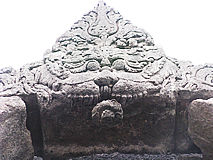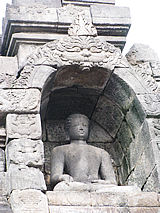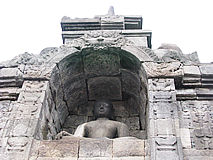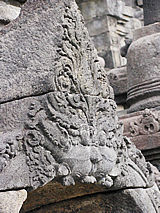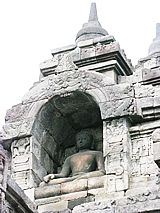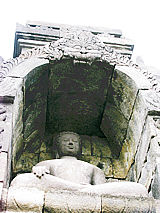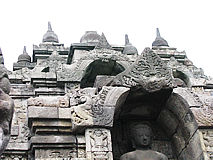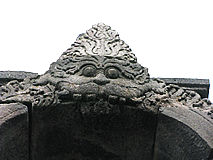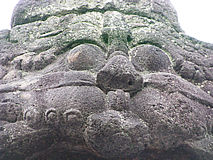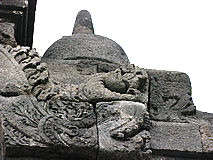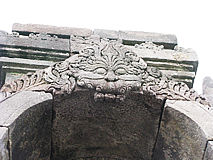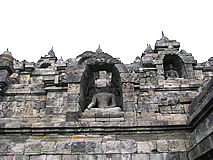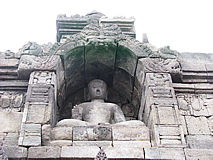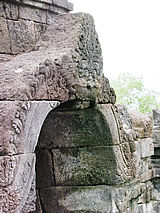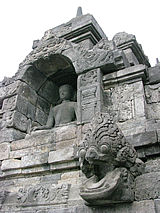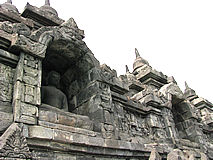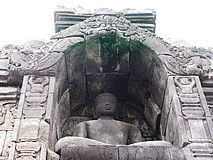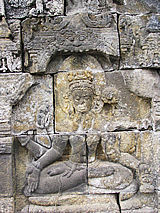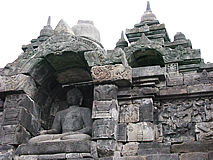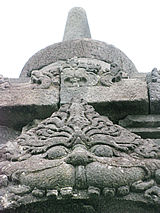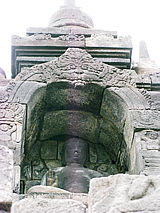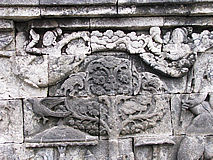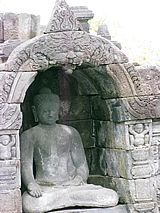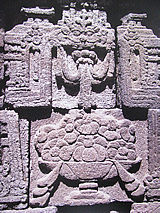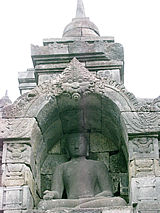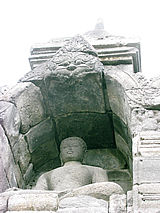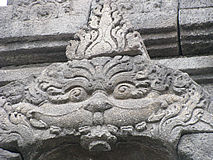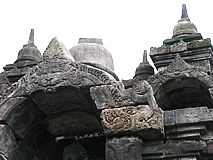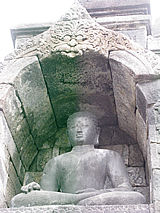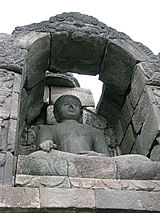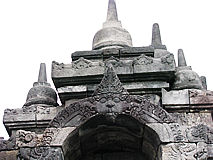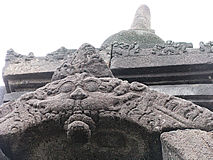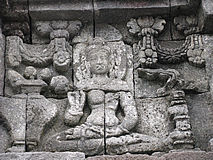CultureRenewalInitiative
HEALING THE PLANET
To begin with yourself
VIVA! JAVA
* Javanese mysticism
(Kebatinan) & Traditional Javanese religious tolerance: a model to the world?
*The Yogya Kraton Myth
*Taman Sari
*The Gunungan
*Tutup Ngisor
*What we can do for Java....
*Java: Land of Kala, its Candi's (Temples):
*Borobudur 1
*Borobudur 2
*Borobudur 3
*Borobudur 4
*Borobudur 5
*Borobudur 6
*Candi Mendut
*Candi Pawon
*Candi Ngawen
*Candi Sari
*Candi Kalasan
*Candi Sambisari
*Candi Prambanan
*Candi Lumbung
*Candi Bubrah
*Candi Sewu
*Candi Plaosan
*Candi Gebang
*Candi Ijo
*Candi Banyunibo
Borobudur: World Holy Site
Gallery 1-4
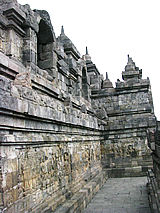 |
FROM BELIEF TO ENLIGHTENMENT |
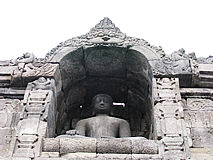 Buddha in the cave. The Cave is a symbol of the Cosmic Womb |
Kala, the Cosmic Mother turned into a Demon
|
||
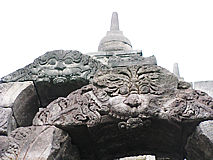 |
First some remarks about my "method of research". It will be clear that a purely historical approach to Borobudur never will have satisfactorily outcomes. Simply because a great deal of findings is missing. Moreover, the interpretation will always cause polemics. Nowadays 500 different publications all claim to have discovered the historical truth. More important, however, is what Borobudur could mean to modern (wo)man. The spiritual dimension is therefore on top of the list. Summarizing: I will do everything to respect historical roots. At the same time - in the light of the global crisis, which in essence is a spiritual one - I will do everything to reveal Borobudur's true meaning. |
|
|
||
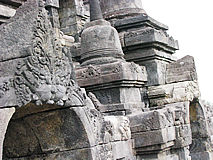 |
|
The Cosmic Mother (Kala) was later replaced by a male God (Shiva). Most of the Hindu temples of Java are dedicated to Shiva LINK Candi Prambanan |
|
||
|
While entering gallery nr. 1 two things are immediately obvious. It consists of panels with carvings left and right of the corridore, while being flanked with meditating Buddha's sitting in niches. This pattern is continued while ascending levels nr. 2, 3 and 4. What is the meaning of this design? Usually, "common" people have only interest in the images. They are fascinated by the stories they represent. Not only "common" people, though. Almost all main authors of books about Borobudur focuss on these narratives, as well. They call the lower gallery "Lalitavistara" or the story about the life of the Buddha. |
|
In the Tibetan region She is called Mahakala |
||
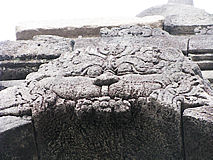 |
 |
|
Kala, the Cosmic Vacuum e.g. Womb is the Destroyer of ego.
|
||
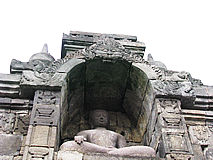 KalaMakara |
While in the West (LINK European Green Man & Wise Woman Network) the feminine and masculine aspects of the Divine were separated - e.g. the Black Madonna's and Green Men (Women), in the East they remained one Deity: KalaMakara. Kala as the Dark Cosmic Womb, Makara as Her active energy, the latter throughout Asia depicted as a Dragon-like creature. |
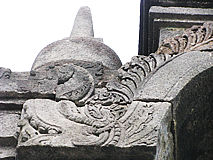 Makara |
Makara |
||
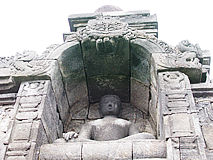 |
This stories are completed by the "Jatakamala" or five episodes in the life of the historical Buddha and the "Awada", tales of Bodhisatvas (to be compared with the "liives of saints" in the Catholic Church. What surprises is, that the life of Buddha Sakyamuni ends with his first sermon at Benares. Apparently, the spiritual people at that time did NOT consider the historical Buddha "to have the last word" in higher (highest) matters..... |
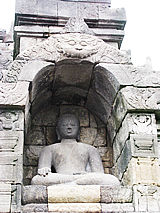 |
Having received their Enlightened State from Emptiness (Darkness, the Womb, the Great Stupa) the Buddha's share it with every sincere seeker |
||
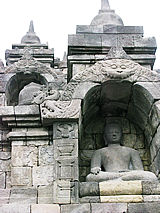 |
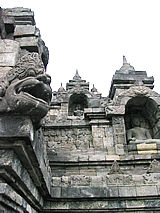 |
|
|
||
 In these most critical of times She is the Savior of the world |
The majority of people identifies with the images, the narratives, the docrines and the promises of Buddist liberation. These vast group is the group of the believers. Identification means to become one with the object of veneration in sich a way that its world becomes your world. Buddhists may be also part of this group. In some cases this can indeed lead to a leap within, in which the phenomenal world is transcended. Most believers, however, are hooked by the world of images and concepts. In the end they don't realize anymore that it is all mindstuff. Some even claim to have realized. It is proof of the fact how far self-delusion can go. |
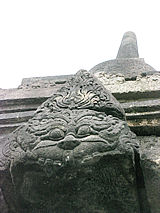 Through destrying everything sick, old, ugly and evil |
|
||
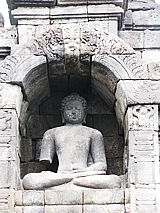 |
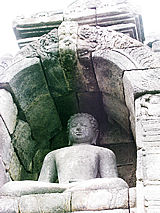 |
|
| Another proof for the supremacy of Kala is, that both Hinduism and Buddhism have portrayed Her on top of Gods and Buddha's. It also means that Kala was there BEFORE those two religions evolved! Especially Prambanan displays a fullness of Kala's. The latter are litterally everywhere. Again, it is strange, that hardly any author has given Her even a minimum of attention. In a way, they couldn't give Her a place in the existing pantheon. Something that only underlines my point! |
|
|
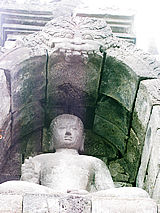 |
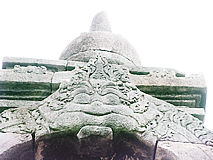 Surrender (your ego) to Her and you will be saved |
|
|
||
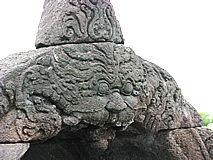 If you resist Her (through clinging to your ego) you will suffer |
However, there are not only stories carved in the galleries. There are also many niches with a meditating Buddha inside. These Buddha's represent not identification but realization. The first step is to DE-identify (....) from the world of thoughts, images, concepts, emotions and desires. The Buddha's in the niches teach you how to become your (the) inner observer. For that you have to "step back" from the phenomenal world, in such a way, that an inner distance will emerge between you - your aware Self - and your (small) mind, the ongoing flow of mind content. It is the first step towards liberation. Although clearly pointing at the opening toward full realization it is important to realize that Borobudur is not rejecting the phenomenal world. To integrate various levels of existence is the essence of "Javanism" |
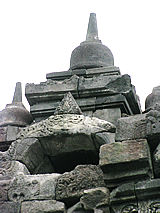 |
|
||
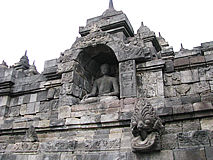 |
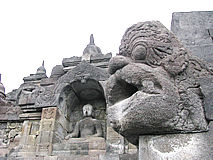 |
|
|
||
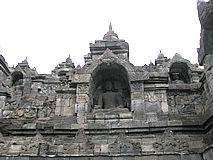 |
IMPORTANT! On Java two entirely different concepts of "Kala" exist. First of all, there is the Original Kala ("O.Kala"). Its (Her) roots go back to (very) ancient times, starting with the "Great Night" or "Cosmic Womb" as the Source of all life. Kala is etymologically feminine. In the course of time She became known as the MotherGoddess Kali. Originally She still embodied the Cosmic Mother, while the Trimurti - Shiva, Brahma and Vishnu - were born out of Her. Later the emphasis was laid on destruction (of evil). So She became known as the Goddess of Death. Because She ruled the universe, Her male "successors" were called "Mahakala" or "the Great Black Ones". Kala turned into the "God of Time". It is the God whose faces we see in Borobudur. He is also identified with Shiva....
|
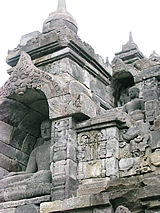 |
|
||
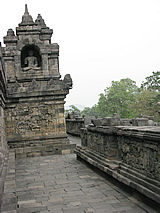 |
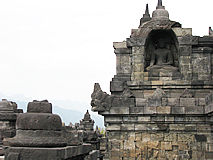 |
|
|
||
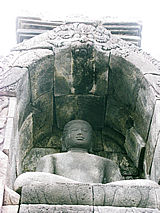 |
IMPORTANT! The second Kala is a totally different one. To many it seems to be the only one they know. This Kala is a demon, representing evil ("e.Kala"). People are afraid of him, giving rise to regular exorcist practises. He is said to be the "Son of Durga". Because the Goddess Durga is closely linked with Kali I got confused. Studying his background I discovered that in contrast to the Original Kala he popped up as a Wayang character only in the 17th century, in a treatise called "The Birth of Kala". First relief: through the time difference of many centuries this Kala cannot be equal to the original One. And indeed, comparing them they are each other's opposites. The former is evil, the latter the destroyer of evil. The case is cleared, but in practice the necessity of explaining the difference to Javanese will be always there, since common people only know Kala as evil. That's why I make a difference between "O.Kala" and "e.Kala"
|
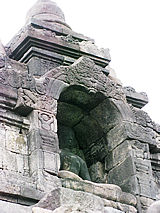 |
Javanese Queen with Kala |
||
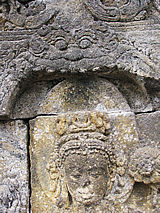 Close-up |
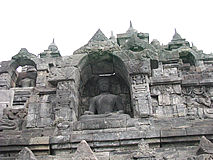 |
|
|
||
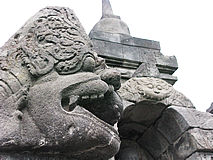 |
IMPORTANT! One has to realize that Javanese people - although thoroughly imbued in Hindu/Buddhsit tradition - never really knew about the backgrounds of Kala. As a demon She played a very insignificant role. She isn't part of the two major Hindu books of Ramayana and Maharabtara. The only way to know Her was through the carvings in/on the Candi's. But most of the Javanese Temples were in ruins, under dense tropical vegetation and this for many centuries. Borobudur was only re-discovered at the end of the 18th century. The result: Javanese never had the opportunity to integrate the Original Kala in their world view e.g. daily lives. Only recently they were able to see that Kala is everywhere. There are hartdly Temples on Java without Kala Heads. That's why I call Java "The Land of Kala". She is the Origin of Hindu/Buddhist culture....and beyond....... |
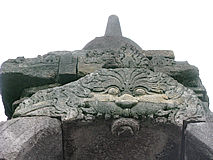 |
Only (Absolute) Emptiness can destroy the ego |
||
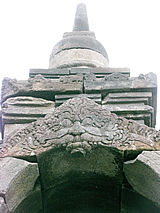 |
The moving around the galleries can be considered the "gradual Path to Liberation" (Enlightenment). Step by step one becomes more aware. Daily life is not an obstacle but supports you in integrating it. That's why meditation (the Buddha-mind) and the the phenomena are two sides of the same coin. The body plays an important part in this. By becoming the body while relaxing in an upward position, the inner observer gains in quality, while at the same time thoughts and images are floating freely, leaving no trace behind. |
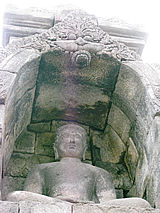 |
|
||
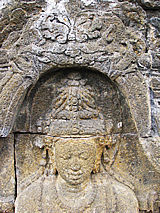 |
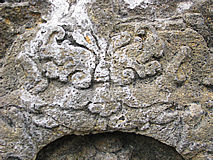 |
|
Tree of Life |
Kala in Javanese culture is a very ambiguous Deity. On the one hand She stands at the birth of the Cosmos... on the other hand She is the fearsome destructive "man-eater". This position She shares with the Hindu Goddess Kali. Kali comes from Kala! meaning The Black One, time and death. However, in India people revere Her as the Destructress of evil, turning Her negative aspect into a positive one. I cannot imagine that Borobudur was evil e.g. death obsessed. Therefore it reminds the Javanese of ancient times in which Kala represented a Cosmic Force that destroys everything, old, sick and evil. The Tantric Path to which Borobudur is intimately linked worships Mahakala as its Supreme Deity. Needless to say that I see Kala exclusively in this perspective. | |
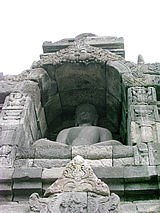 |
At the end of round (cycle) one, a huge Kala Head is inviting you to proceed through Her Gate of Death and Rebirth, entering a new dimension in spiritual Realization. Not all will feel invited to do so. They remain on level one, practising and cultivating being in the HereNow. These people are called awakened ones*, because they realized the most important step in spiritual life, the leap from ignorance to awareness. Others do feel ready for a next round, the longing for Enlightenment igniting their Hearts. * Buddha is wrongly called "The Awakened One". This should be "The Enlightened One" |
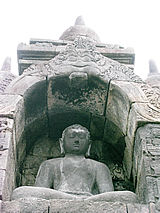 |
|
||
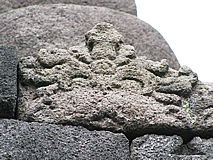 |
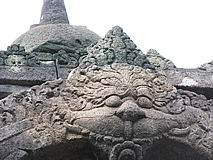 She helps you in dropping your ego. How compassionate She is! |
|
| For the first time you might become intrigued by these Kala Head, which - as you suddenly realize - are all over the place. You notice that all meditation Buddha's - including the five "biggies" of Tantric Buddhism - have ALL a Kala Head on top of their niche. You ask your guide and he will tell you that Kala is "the God of Time", confronting every human being with the fragality of life. |
Kala and the (Her) "Vessel of Abundance" |
After going within for a little insight you are increasingly puzzled. Because why have Buddha's - the one who have overcome time - still a Kala head on top of them. Moreover, is the "God of Time" so important, that EVERY Buddha has one. Another question, why the "God of Time" has the appearence of a Demon? He is an "official God" after all. Knowing that Demons - especially the awe-inspiring ones - have always been powerful Deities of a previous era, now (under Buddhism) suppressed or degraded as "protectors" or "guards" you get intrigued and start searching for the Truth |
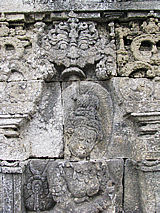 |
The fact that Kala's are always ON TOP of Rulers, Kings AND Buddha's means that the former are superior to the latter. So, what is higher than BuddhaHood? |
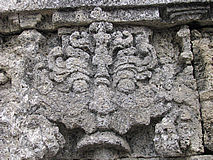 |
|
||
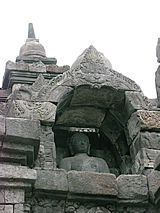 |
This longing is embodied by Sudhana, the son of a merchant. His "Search for Ultimate Truth" is depicted in the Gandawyuha, occupying galleries 2,3 and 4. The importance of this stage on the Path is emphasized in various ways. First of all the Gandawyuha includes 488 panels, in contrast to the Lalitavistara (Buddha's life) which has only 120 panels. Furthermore, Sudhana is a lay person! Seen against the background of the all-dominating monk-caste, this is quite remarkable. The Path towards Enlightenment belonged to everyone! Thirdly, while in almost all Buddhist sects the Buddha (in various forms) is the ultimate authority, Sudhana freely consults tens of various advisors and guides. The Buddha not even having a special place among them.* The emphasis lies on Maitreya, the future Buddha. * Remember: the story of the Buddha ended with his FIRST sermon. He was apparently not considered capable of guiding you further on the Path. A shocking fact to Buddhists, for sure.... |
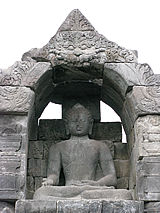 |
|
||
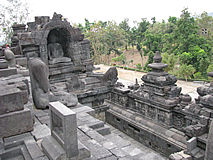 |
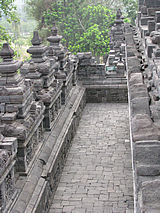 |
|
You only have to say (pray): please, Mother take my ego away from me |
||
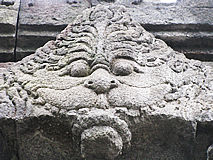 At the same time visualizing that your ego disappears into Her Dark Womb |
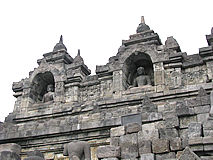 |
|
|
||
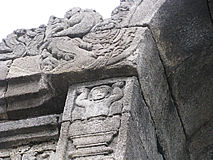 Makara |
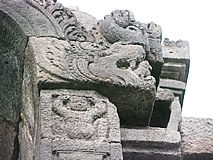 Makara |
|
|
||
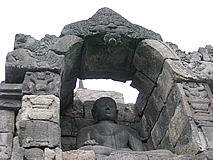 |
Does it dawn to you that Borobudur "is different?" How did the founders DARE to deviate from orthodoxy is such an open way?*. The secret is: Java. Java still kept memory of its past e.g. roots. Not only because of its mixing with Hinduism, but even more with ancient-old wisdom from pre-Hindu and Buddhist times. While others always reject the past in favor of the newcomber, Javanism always integrated the new into the existing. The memory of that past included the reverence for women. Its foundation was the archaic MotherGoddess from the Middle East. Her Dark Womb** is the Origin of the Eternal Light and the entire universe. This harmonized very well with the Buddhist concept of "Emptiness beyond Emptiness" on the one hand and the Kala as the Destructive aspect of the Original Mother (Cosmic Womb), on the other, areas with which indeed the historical Buddha wasn't very "familiar" with.... * Me being well aware of the diversity of Buddhist sects and schools ** The Buddha realized his Enlightenment in the night. Even he could know that the "Light is born out of Darkness" |
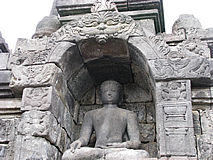 |
| Sultan Hamengko Bwono I of Yogykarta had his water palace ("Taman Sari") built under the protection of Kala. She can be seen in every corner of the building. How can a Muslim Sultan even have the idea of revering Kala? The answer: in order to unite his people he "needed" a Deity from pre-Hindu, Buddhist, Christian and Muslim times. This couldn't be a God, because this would immediately create trouble with the other Gods. So, he (very wisely) chose "something that is BEYOND all Gods. This could only be the Original Cosmic Mother, in Java known under the name of Kala.... |
|
|
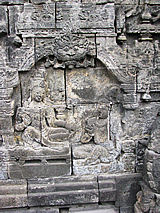 Kala and Maitreya Buddha |
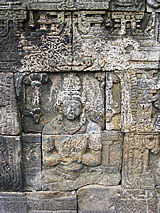 |
|
Go through Her Gate of Death and Rebirth |
||
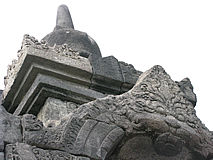 |
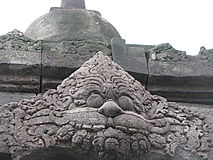 And you will become renewed.... |
|
|
||
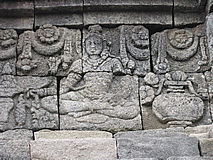 Five out of many Goddesses at Borobudur, all offering the "Vessel of Abundance" (Cosmic Womb) |
The more the gallery comes to a close, the stronger the feminine element. It is related to the left-hand Tantra, a sect that greatly influenced Borobudur. The Feminine is the Essence - empty Space - while massculinity is Her active part. This too is directly related with the ancient notion of the Cosmic Mother and Her Son/Lover. "Om Mani Padme Hum" - the main mantra - means "Jewel in the Lotus", which is identical with the previous. Maitreya - according to some sources - is a transformation of the pre-Hindu Goddess Hariti. In later (Chinese) Buddhist scriptures he is "sent to earth" by the Eternal Mother in order "to save Her children". The "future" Buddha is Her Servant! Sudhana's last resort is Samantabhadra, also a Goddess related bodhisattva*. Not surprisingly thus, that the closer Sudhana reaches his goal the more prominent the Feminine, embodied by various impressive Goddesses, each sharing the Vessel of Abundance (in the West known as the Grail!) - meaning the Cosmic Womb - with every sincere seeker.... * Some say he is the manifestation of Srimala, the famous Queen who promoted the Tathagatagarbha (Womb of the Buddha's). Sri Kahulunan, the Sailendra Princess and driving force behind the founding of Borobudur, could very well be inspired by her famous predecessor! |
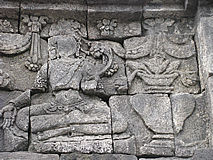 |
|
||
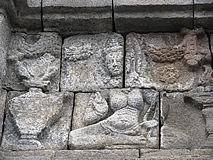 |
Emphasis on the Divine Feminine e.g. the Cosmic Womb...... |
 |
|
Prambanan-4
For the final Kala Story
See: Prambanan-3
1997-2011
© Copyright Han Marie Stiekema. All rights reserved.
Everyone may use this website as a source of inspiration. However, since it
is freely given, no-one can claim, copy or derive any text, rights,
position or status from this website.
Last revising: 07/18/12
